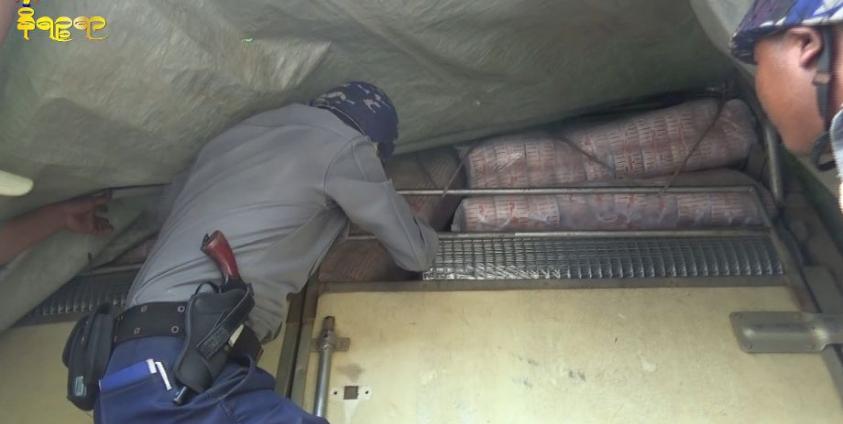The military council continues enforcing various laws against the transportation of specific goods from the mainland Burma to Rakhine State through land routes.
Local businessmen and truck drivers reported that despite the informal cease-fire between the Arakan Army (AA) and the military rulers in Rakhine State, the restrictions are still ongoing on over various items like cooking oil, building material, furniture, electronic equipment, medicines etc.
“Transporting electronic goods may require a small fee, whereas building materials, including cement and medicines, may require certificates. Additionally, many items brought to Rakhine State require necessary approvals from the security and border affairs ministry,” said a truck driver who did not want to be named.
The approval certificate is not required for clothes, beauty products, plastic materials, fabric packaging, and some selected food products.
“Only confectionery products are permitted for import, while all other types of food must be accompanied by the appropriate approval documents”, said another motorist.
Even with an approval certificate, the large trucks transporting goods must pay some fees to the checkpoints along Yangon-Sittwe highway. According to a seller of building materials, only those with the certificates are permitted through the highway bus stations.
Locals have alleged that the prices of many essential commodities are rising because of unreasonable restrictions on the way.
“The price of medicine fluctuates frequently, but it rarely drops. Now, I have to pay increasingly high prices for the medicines I have been taking for years. Similarly, the price of cooking oil has also become a concern as it requires careful budgeting. Since 2021, the cost of goods has consistently risen and showed no sign of decreasing,” said a housewife from Sittwe township.
The motorists have alleged that the security forces have established multiple checkpoints from the west of Rakhine Yoma mountain range to extort money from the passengers citing various reasons.
“Transporting furniture products become the most challenging job, even with some improvements in the checkpoints located in Ann township. Unfortunately, we still have to pay fees to ensure our goods transported smoothly. It's common for all checkpoints to pay money
whenever goods are transported on the passenger buses. In certain areas, passengers are asked to disembark the bus and walk along the road. Often one passenger is charged Kyats 2000,” informed a highway bus driver.
Motorists added that the allegations of extortion at checkpoints by the Military Council would be validated if the top administrative officers were to ride in civilian cars and observe the situation firsthand.
Following the resurgence of conflicts with the AA last year, the military council blocked both the roads and waterways in Rakhine State which are crucial for the local people. It led to a significant increase in prices of essential commodities in the region.
“One of the major factors contributing to the high commodity prices here is the expensive transportation arrangement. The bus fares remain high as the fuel price continues rising. Additionally, numerous checkpoints on the way create more problems to the passengers. For
instance, in Myebon township there is a 1100-foot-long bridge over Yaw creek where soldiers have been collecting toll fees since last month.
They charge Kyats 30000 for a 12-wheeler and Kyats 20000 for a 6-wheeler,” said a local driver.
Taking advantages of the temporary ceasefire, the military council has increased the number of checkpoints on the main road. These checkpoints have created difficulties in importing various goods.
Narinjara News tried to get comments from the Rakhine State government regarding the current circumstances, but no one responded. Despite contacting Rakhine State security and border affairs minister colonel Kyaw Thura, it failed to get any answer.







